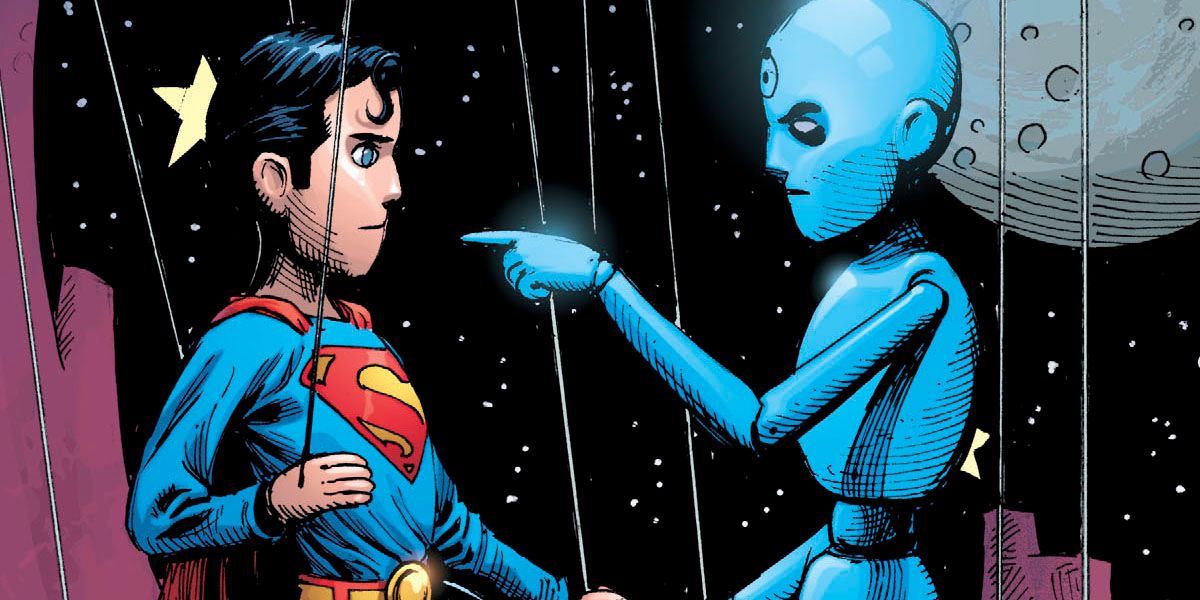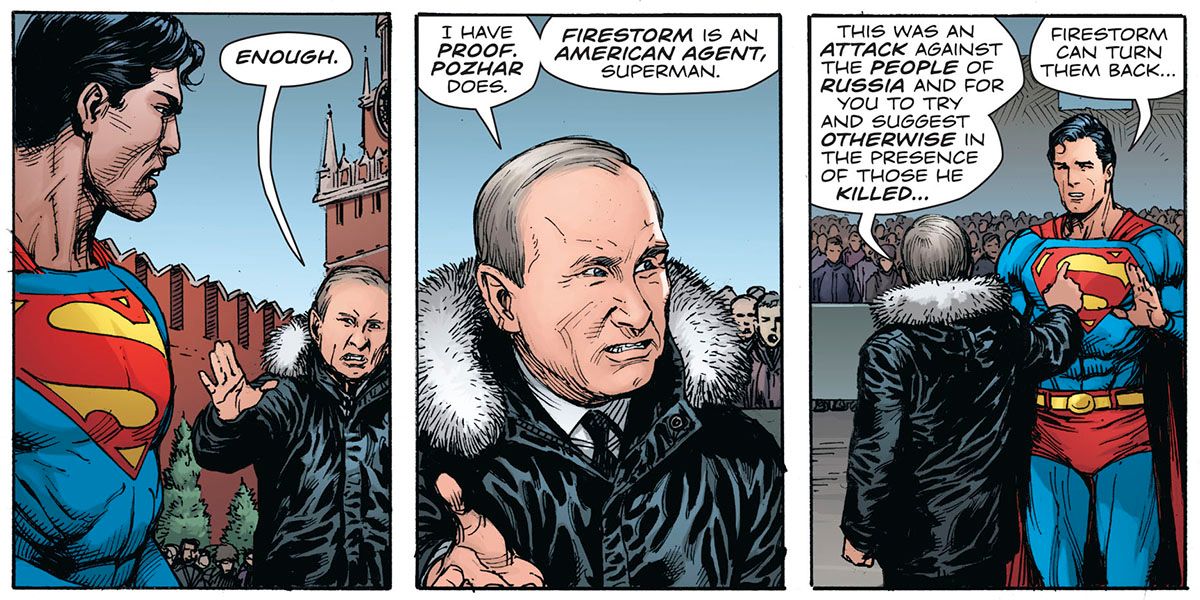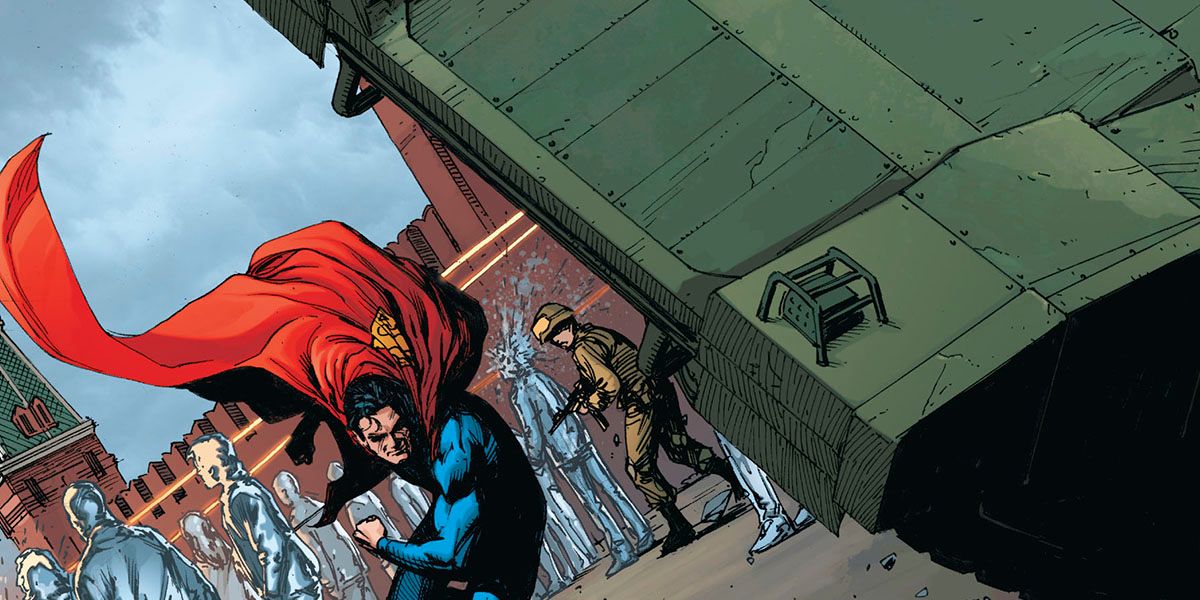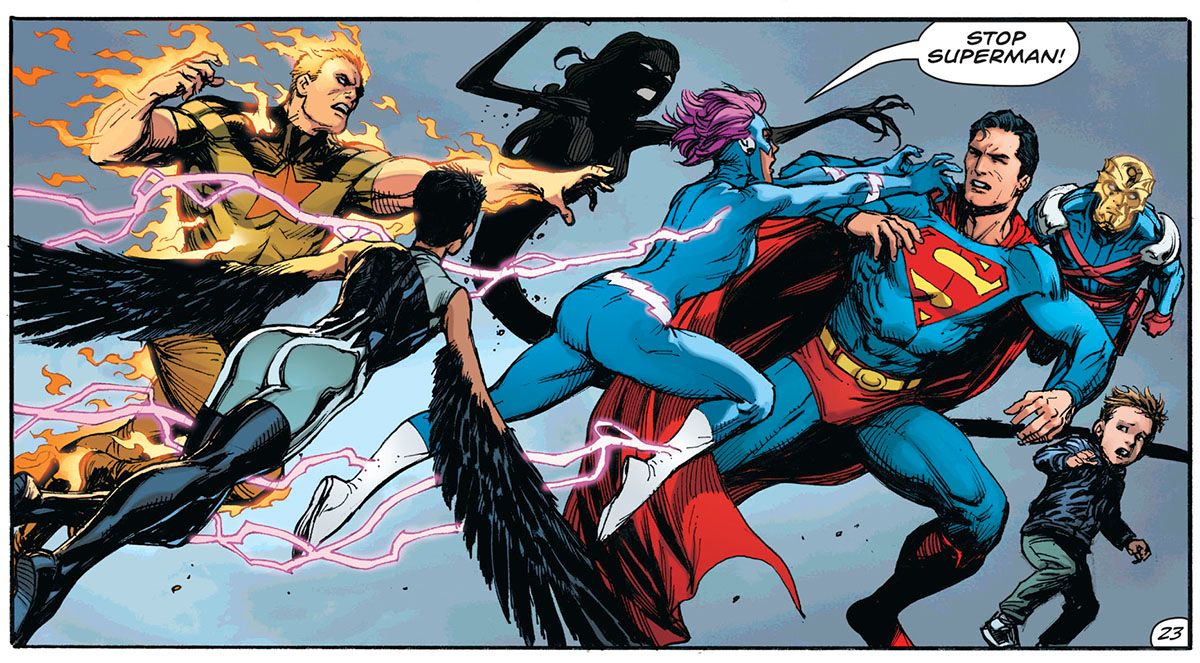SPOILER WARNING: The following article contains major spoilers for Doomsday Clock #8 by Geoff Johns, Gary Frank, Brad Anderson and Rob Leigh, on sale now.
Superman may be from Krypton, and he may be a superhero for the whole world, but when it comes the DC Universe, there are few superheroes more intrinsically tied to America and what the country is supposed to stand for than the Man of Tomorrow. After all, it’s right there in the catchphrase: “Truth, justice and the American way.” Whether he wants to be recognized as such or not, Superman represents the United States of America on a global scale, and a lot of the time, that can be a great thing. As a refugee who was welcomed and embraced by his adopted homeland, he grew up to represent all the positive aspects of American culture and of the American people.
RELATED: Doomsday Clock #8 Annotated, Part 2: Watchmen Callbacks & Timeframe Questions
However, this also makes him uniquely vulnerable to manipulation which can reflect badly on his home country when he chooses to operate on that global scale, and though not appointed by an administrative body, Superman’s actions can be seen as those of America in times of conflict as much as in times of peace. That’s exactly the situation the hero finds himself in as the machinations of Ozymandias ensnare the Man of Steel and the mystery of The Supermen Theory turns deadly, with Superman right at the heart of an international incident which threatens to bring the biggest threat of the Watchmen universe to the doorstep of the heroes of the DCU.
International Incident
One of the biggest mysteries at the heart of Doomsday Clock is The Supermen Theory, which posits that the reason America has ninety percent of the world’s superhumans is due to a government conspiracy to win a superpowered arms race before the rest of the world even knew that it was taking place. Classic, fan-favorite characters like Metamorpho and Firestorm have been found to be at the heart of this conspiracy, and it’s these claims that bring The Nuclear Man to Moscow to face his enemy Pozhar, leader of The People’s Heroes, who has been one of the biggest proponents of The Supermen Theory.
RELATED: Doomsday Clock #8 Annotated, Pt 1: Superman, Russians & A F*d-Up Firestorm
When the young hero makes a major mistake and turns a crowd of citizens to glass, it’s Superman who intervenes to give him the inspiration he needs to fix it, finding Ronnie Raymond hiding in Kahndaq which Black Adam has opened up to all metahumans as a safe haven. Superman and Firestorm return to Russia to make amends and fix Ronnie’s mistake, but tensions flare and Superman is forced to take a stand against the Russian military to stop their tanks from shattering the temporarily frozen citizens. However, the complexities of the action are lost on the world’s media who see Superman as siding with the metahuman community over world governments, which is kind of a worst case scenario for those in power.
NEXT PAGE: Superman's Mistake, and Has Doctor Manhattan Been Hiding in Plain Sight for Years?
Metahuman Affairs
Superman’s actions don’t just affect American/Russian relations, although that’s an important theme which harkens back to Watchmen, it draws a line in the sand between metahuman and baseline human in a way that DC never really has before. If anything, it’s more reminiscent of how Marvel treats the line between mutant and flatscan human, and how many humans are scared of their eventual replacement and subjugation at the hands of their super-powered cousins. “What if Superman decided he knew best” is well trod ground from the Injustice games to Ultraman of Earth-3 to analogous characters such as The Plutonian in Irredeemable and Marvel’s King Hyperion.
RELATED: Doomsday Clock Art Teases the Legion's Arrival, JSA's Rewritten History
It’s an expectation that Superman has had to deal with for as long as he’s operated as a superhero, and while his intentions were not what the papers are making them out to be, it’s going to be hard to win back the trust of the general public after he’s been seen defending a seemingly rogue metahuman suspected of being involved in the grand superhuman conspiracy. Superman needs to be seen as impartial and infallible for the people to trust him; that’s why Siegel and Shuster’s unapologetically socialist Superman of the Golden Age could never last. Superman isn’t one to take sides, and whoever is pulling his strings is doing an excellent job of making him do so in the worst possible way.
Arms Race
Then there is the Russia of it all, as whoever has been stoking The Supermen Theory — whether it’s true or not — has been doing so to set up America as the evil boogeymen of the metahuman world, secretly working to get an advantage over everyone else and concoting outlandish explanations as to how these fantastical beings got their powers. The fact that it’s reminiscent of the global tensions of Watchmen isn’t a coincidence; in Watchmen, Ozymandias manipulates the world into getting along by dropping a psychic squid on Manhattan, killing thousands but uniting the world against an alien threat.
RELATED: Doctor Manhattan's Meddling Officially Rewrites Green Lantern History
The last few panels of Doomsday Clock #8 show Ozymandias watching the events in Russia and commenting that “it begins” which raises larger questions about what Adrien Veidt’s true motives are. He journeyed to the DC Universe to bring back Doctor Manhattan to fix his own world, so why is he so interested in the events of this one? Is he manipulating everything, or as The World’s Smartest Man, does he see the shape of the plan put in place by whoever concocted The Supermen Theory? The bright blue light at the end of the issue certainly brings to mind that of Doctor Manhattan; has he been hiding out as Firestorm? Their powers really are awfully similar, if you get into the nuts and bolts of it.
Doomsday Clock #8 brings the mystery at the corners of the DC Universe to the center stage for the first time and raises all these questions and more. The series is at its most exciting and energetic when it focuses on the DC heroes and the parallels to Watchmen over the Watchmen characters themselves, and while the first half of the series focused on how the DCU affected the Watchmen characters, the introduction of Superman suggests that the remainder of the series will show the effects of the Watchmen universe has on the DC Universe and how the two worlds are ultimately incompatible.




